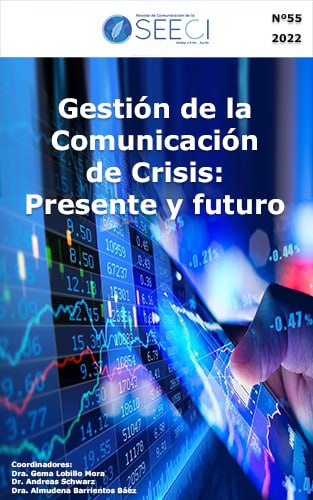Presentation of the Monograph: Crisis Communication Management. Present and future
Main Article Content
Abstract
The concept of crisis has also been evolving to adapt to the new realities of communication (Suárez and García, 2010). According to Coombs (1999), adequate crisis management must involve prevention, preparation, performance and learning. It is difficult to prevent when there is no previous experience with totally new situations.
The communications landscape is more changeable than ever, making crises almost unpredictable. After suffering the most significant global crisis of all time, such as COVID-19 (Casero-Ripollés, 2020; Costa-Sánchez and López-García, 2020), organizations have had to redefine themselves to remain competitive in different markets. We face challenges and paradigms that are difficult to anticipate in a globalized and connected world, where crises are amplified exponentially (Losada, 2018).
Crisis management is essential for governments, companies, administrations, projects and any organization through appropriate strategic communication programs. Therefore, it is necessary to deepen research in communication, putting in value the trends in this area.
Health crises (Lorente, 2010), loss of reputation due to mismanagement (Xifra, 2020), fear management as an instrument of persuasion (Rodríguez-Andrés, 2011) are some of the topics that require special attention in order to understand the response of stakeholders to adverse situations.
In this monograph we call for articles to delve into crisis management and new trends in communication and marketing policies of organizations, as well as political communication as a way of connecting with society. Special attention is also given in this call for papers to research on the credibility of organizations, through social responsibility programs or other forms of communication. In addition, the link between health crises and SDGs becomes essential in the times we live in.
Priority lines in this monograph:
- Crisis communication management from governments. Trends
- Crisis communication strategies in companies. Social responsibility policies
- Corporate and marketing strategies in communication companies
- Political communication
- The crises to come and credibility vaccines
- Crisis communication, Health and SDGs
Downloads
Article Details
The Journal of Communication of SEECI recognizes and promotes copyright rights, as well as the need to disseminate knowledge in an accessible and equitable manner. Our journal operates under a Creative Commons License CC BY-NC 4.0, which allows authors and users to:
- Share and Adapt: Copy, redistribute, and adapt the material published in the journal in any medium or format.
- Attribution: Properly acknowledge authorship and provide a link to the license, indicating if any changes have been made.
- Non-Commercial: Do not use the material for commercial purposes without the express permission of the authors and the journal.
- Authors retain copyright and may enter into non-exclusive agreements for self-archiving, deposit, or distribution of the publisher's version published in this journal, including institutional, national, or international repositories, and personal websites.
References
Casero-Ripollés, A. (2020). Impact of Covid-19 on the media system. Communicative and democratic consequences of news consumption during the outbreak. Profesional de la Información, 29(2), e290223. https://doi.org/10.3145/epi.2020.mar.23
Coombs, W. T. (1999). Ongoing Crisis Communication: Planning, Managing, and Responding (1ª ed.). Sage Publications.
Coombs, W. T. (2010). Crisis communication and its allied fields. In W. T. Coombs & S. J. Holladay (Eds.), The handbook of crisis communication (pp. 54-64). Wiley-Blackwell.
Costa-Sánchez, C. y López-García, X. (2020). Comunicación y crisis del coronavirus en España. Primeras lecciones. Profesional de la información, 29(3), e290304. https://doi.org/10.3145/epi.2020.may.04
Diers-Lawson, A. (2017). A State of Emergency in Crisis Communication an Intercultural Crisis Communication Research Agenda. Journal of Intercultural Communication Research, 46(1), 1-54. https://doi.org/10.1080/17475759.2016.1262891
Ha, J. H., & Boynton, L. (2014). Has crisis communication been studied using an interdisciplinary approach? A 20-year content analysis of communication journals. International Journal of Strategic Communication, 8(1), 29-44. https://doi.org/10.1080/1553118X.2013.850694
Schwarz, A., Binetti, J.-C., Broll, W., & Mitschele-Thiel, A. (2016). New technologies and applications in international crisis communication and disaster management. In A. Schwarz, M. Seeger, & C. Auer (Eds.), The Handbook of International Crisis Communication Research (pp. 465-477). Wiley Blackwell.
Schwarz, A., Seeger, M. W., & Auer, C. (2016). Significance and structure of international risk and crisis communication research: Toward an integrative approach. In A. Schwarz, M. Seeger, & C. Auer (Eds.), The handbook of international crisis communication research (pp. 1-10). Wiley Blackwell.
Sellnow, T. L., & Seeger, M. W. (2021). Theorizing Crisis Communication (2 ed.). Wiley Blackwell.
Zerfass, A., Hagelstein, J., & Tench, R. (2020). Artificial intelligence in communication management: a cross-national study on adoption and knowledge, impact, challenges and risks. Journal of Communication Management, 24(4), 377-389. https://doi.org/10.1108/JCOM-10-2019-0137








